Business
Importance of GSP for apparel sector

An apparel worker
By Jeevith Senaratne
Sri Lanka’s apparel industry – which accounts for 47 per cent of the nation’s exports and 15 per cent of industrial employment – is critical to our national economic health and well-being. Therefore, ensuring that the industry remains strong and resilient should be very high on our list of national priorities.
Given this backdrop, managing Sri Lanka’s relationships with key trading partners becomes highly significant, especially the few that we have preferential trading relationships with. A case in point is the European Union (EU).
The Generalised System of Preferences (GSP) or GSP, a preferential tariff system of the EU, one of our main export markets, plays a key role in Sri Lanka’s export competitiveness – and in the apparel industry’s success story. We cannot afford to lose access to our second largest export market, but the risk of that happening is real.
Here’s a situational summary: the European Parliament asked the European Commission (EC) to consider suspending Sri Lanka’s GSP+ status (explained a few paragraphs below), which it had restored in 2017 after first revoking it in 2010. The EC’s decision-making processes are however, grounded in economic rationale, and different from the calculus of the European Parliament, whose considerations are primarily political.
The timing is significant; the current GSP regulations will expire on 31st December 2023, and the renewal of the scheme is under review at present. This matters for another important reason: two other markets that the Sri Lankan apparel industry hopes to enter – Japan and Australia – also have GSP schemes, modelled on the EU. The EC’s actions could – potentially – affect those plans.
There are other reasons GSP+ access needs to be protected; look at the economic benefits that the apparel industry has contributed, the jobs it has created, its impact on economic development across the country, the reduction between rural and urban incomes that it has enabled and how it has empowered women by dramatically increasing their participation in the workforce.
Apparel accounted for 59 per cent of our country’s merchandise exports in 2020: $4.4 billion out of $7.7 billion, and just a shade under 5.5 per cent of GDP. It employs 350,000 people directly, and roughly twice that number indirectly. Women are 78 per cent of the industry’s employees, compared to the national average of 34 per cent for female participation in the workforce.
A 2018 study by the data analytics and insights company Kantar found that employees in the apparel industry were proud of being part of it; women felt empowered and glad to have economic independence. Additionally, earnings of people moving from rural to urban apparel industry jobs, boosts incomes in rural Sri Lanka, reducing rural poverty substantially.
A brief explanation of what GSP is, and how it works will help understand why retaining it is important. In essence, GSP+ is a special incentive arrangement aimed at sustainable development and good governance in vulnerable, low and lower-middle income countries. Vulnerability is assessed based on a country’s imports and economic diversification.
GSP+ countries – there are 7 others apart from Sri Lanka – have to implement 27 core international conventions on human rights, labour rights, protection of the environment and good governance. The EU reduces customs duties for the products under the general GSP arrangement to 0 per cent for GSP+ countries. GSP+ benefited roughly $1.9 billion of Sri Lanka’s exports to EU countries in 2019.
In its 2019 annual report, the EU said apparel accounted for 48 per cent of the 184 billion Euro under GSP+. This number highlights how vital being eligible for GSP+ is to remain competitive in accessing the European market.
Since we import a little over half the raw materials used in the apparel industry, we cannot, under current EU rules, get zero duty benefits on the full value of apparel exports to the EU, which were $1.2 billion in 2019. Zero duties were allowed on $586 million, or roughly 42 per cent.
That’s because we use a large part of imported content in our apparel. GSP+ has conditions called ‘country of origin’ rules, whereby you can only benefit from zero duty if the product was made from fabric that originated from a SAARC country.
The upcoming fabric processing park at Eravur gains additional importance in light of this. This fabric park is a project that has been under consideration for a long time; and when completed, it will add to our raw material processing capacity and enable import substitution. The decision by the GoSL to expedite this park will be a major boost to the Sri Lankan apparel manufacturer as it will allow for a greater utilization of GSP+. The zone will have a central wastewater treatment facility which is of significant value to investors in a fabric park.
In layman terms, at least in apparel, the loss of GSP+ would on average make Sri Lankan exports to the EU 9.5% more expensive than it is in the status quo. This “surcharge” would come on the back of Sri Lankan apparel already being more “expensive” than that of our competitors.
Rather than being cost-competitive like some competitor nations, our apparel industry focuses on value addition, estimated at close to $2.4 billion on $5.3 billion of apparel exports in 2019 (after deducting costs of raw material imports), or 52 per cent. With strategic initiatives like the fabric park in Ervaur, we can aim towards 65% value addition within Sri Lanka in the not-too-distant future. However, the viability of ventures such as the fabric park hinge on investors being able to reap the full reward presented through the existence of preferential trade agreements.
Business
IMF staff team concludes visit to Sri Lanka
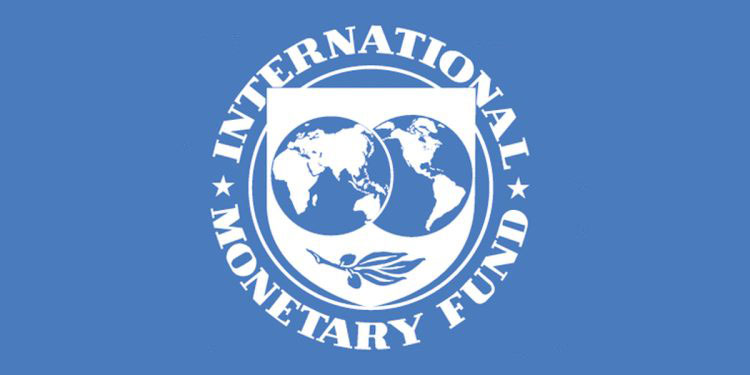
An International Monetary Fund (IMF) team led by Evan Papageorgiou visited Colombo from April 3 to 11, 2025. After constructive discussions in Colombo, Mr. Papageorgiou issued the following statement:
“Sri Lanka’s ambitious reform agenda supported by the IMF Extended Fund Facility (EFF) continues to deliver commendable outcomes. The post-crisis growth rebound of 5 percent in 2024 is impressive. Inflation declined considerably in recent quarters and has fallen to ‑2.6 percent at end-March 2025. Gross official reserves increased to US$6.5 billion at end-March 2025 with sizeable foreign exchange purchases by the central bank. Substantial fiscal reforms have strengthened public finances.
“The recent external shock and evolving developments are creating uncertainty for the Sri Lankan economy, which is still recovering from its own economic crisis. More time is needed to assess the impact of the global shock and how its implications for Sri Lanka can be addressed within the contours of its IMF-supported program.
“The government’s sustained commitment to program objectives is ensuring policy continuity and program implementation remains strong. Going forward, sustaining the reform momentum is critical to safeguard the hard-won gains of the program and put the economy on a path toward lasting macroeconomic stability and higher inclusive growth.
“Against increased global uncertainty, sustained revenue mobilization efforts and prudent budget execution in line with Budget 2025 are critical to preserve the limited fiscal space. Boosting tax compliance, including by reinstating an efficient and timely VAT refund mechanism, will help contribute to revenue gains without resorting to additional tax policy measures. Avoiding new tax exemptions will help reduce fiscal revenue leakages, corruption risks and build much needed fiscal buffers, including for social spending to support Sri Lanka’s most vulnerable. Restoring cost recovery in electricity pricing will help minimize fiscal risks arising from the electricity state-owned enterprise.
“The government has an important responsibility to protect the poor and vulnerable at this uncertain time. It is important to redouble efforts to improve targeting, adequacy, and coverage of social safety nets. Fiscal support needs to be well-targeted, time-bound, and within the existing budget envelope.
“While inflation remains low, continued monitoring is warranted to ensure sustained price stability and support macroeconomic stability. Against ongoing global uncertainty, it remains important to continue rebuilding external buffers through reserves accumulation.
“Discussions are ongoing, and the authorities are encouraged to continue to make progress on restoring cost-recovery electricity pricing, strengthening the tax exemptions framework, and other important structural reforms.
“The IMF team held meetings with His Excellency President and Finance Minister Anura Kumara Dissanayake, Honorable Prime Minister Dr. Harini Amarasuriya ; Honorable Labor Minister and Deputy Minister of Economic Development Prof. Anil Jayantha Fernando, Honorable Deputy Minister of Finance and Planning Dr. Harshana Suriyapperuma, Central Bank of Sri Lanka Governor Dr. P. Nandalal Weerasinghe, Secretary to the Treasury Mr. K M Mahinda Siriwardana, Senior Economic Advisor to the President Duminda Hulangamuwa, and other senior government and CBSL officials. The team also met with parliamentarians, representatives from the private sector, civil society organizations, and development partners.
“We would like to thank the authorities for the excellent collaboration during the mission. Discussions are continuing with the goal of reaching staff-level agreement in the near term to pave the way for the timely completion of the fourth review. We reaffirm our commitment to support Sri Lanka at this uncertain time.”
Business
ComBank unveils new Corporate Branch at Head Office
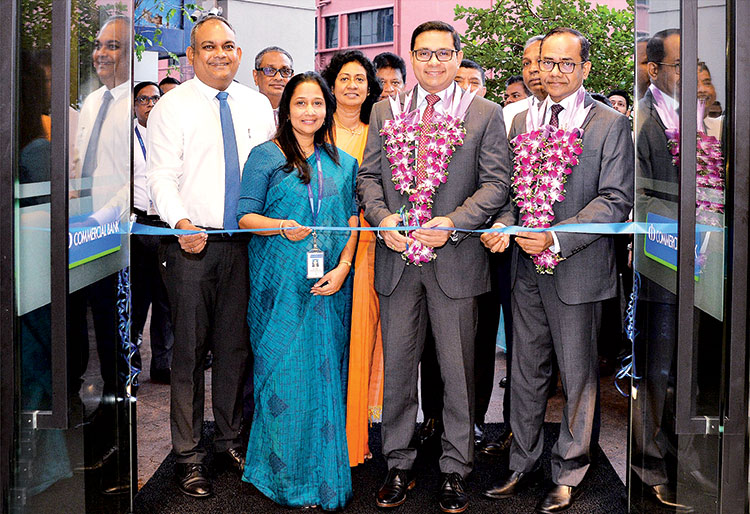
The Commercial Bank of Ceylon has transformed its iconic ‘Foreign Branch’ into the ‘Corporate Branch,’ reaffirming its commitment to delivering dedicated, comprehensive financial solutions to corporate and trade customers.
The Bank said this transformation represents a new milestone in its illustrious journey, and resonates with the rich commercial heritage of Colombo, a city that has long served as a vital trading hub in the region.
Strategically located at the Bank’s Head Office at Commercial House, 21, Sir Razeek Fareed Mawatha (Bristol Street), Colombo 1, this rebranded Corporate Branch stands as a first of its kind in Sri Lanka —a premier financial hub tailored exclusively to the needs of corporate customers, the Bank said. The transformation aligns with the Bank’s vision of providing unparalleled service excellence, bespoke financial solutions, and fostering long-term business partnerships.
Commenting on this strategic initiative, Commercial Bank’s Managing Director/CEO Sanath Manatunge stated: “It is our aspiration that just as the historic Delft Gateway, at which our Head Office is located, once opened the path to the Dutch Fort, our Corporate Branch will chart a new era of enduring and prosperous business collaborations, that will extend beyond Sri Lanka’s shores.”
Business
Fits Retail and Abans PLC Unveil Exclusive DeLonghi Premium Coffee Experience
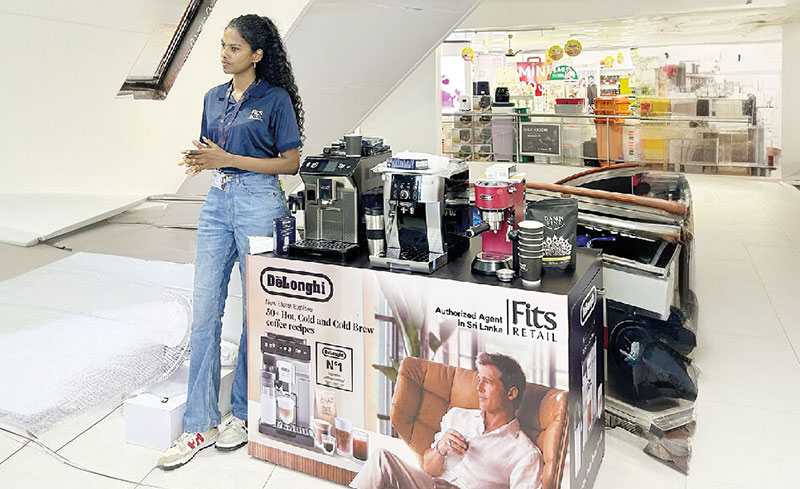
Fits Retail has partnered with retail giant Abans PLC to showcase the iconic DeLonghi coffee machines at two of Colombo’s most prestigious locations: Abans Elite Colombo 3 and Abans Havelock City Mall showrooms.
At these dedicated demonstration zones, visitors can discover the unparalleled precision engineering and user-friendly technology that have made DeLonghi machines the preferred choice for discerning coffee lovers in more than 46 countries worldwide. Renowned for consistently delivering café-quality espresso, cappuccino, and even specialty cold brews, DeLonghi machines exemplify Italian innovation at its finest.
Yasas Kodituwakku, CEO of Fits Retail, expressed excitement about the collaboration: “This partnership represents our unwavering commitment to bringing global coffee excellence to Sri Lankan connoisseurs. With Abans PLC, we’re creating more than just demonstration spaces; we’re curating premium destinations for an authentic coffee experience.”
“As pioneers of premium lifestyle experiences in Sri Lanka, our collaboration with Fits Retail aligns seamlessly with our vision of elevating everyday moments into exceptional experiences,” said Tanaz Pestonjee, Director Business Development at Abans PLC.
-

 News5 days ago
News5 days agoSuspect injured in police shooting hospitalised
-

 Features6 days ago
Features6 days agoRobbers and Wreckers
-

 Business6 days ago
Business6 days agoBhathiya Bulumulla – The Man I Knew
-

 Business5 days ago
Business5 days agoSanjiv Hulugalle appointed CEO and General Manager of Cinnamon Life at City of Dreams Sri Lanka
-

 Business7 days ago
Business7 days agoNational Anti-Corruption Action Plan launched with focus on economic recovery
-

 Features4 days ago
Features4 days agoLiberation Day tariffs chaos could cause permanent damage to US economy, amid global tensions
-
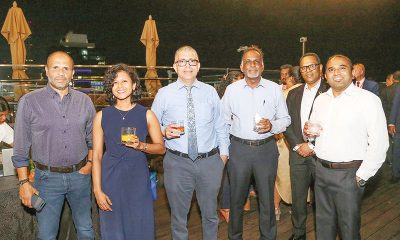
 Business4 days ago
Business4 days agoMembers’ Night of the Sri Lanka – Russia Business Council of The Ceylon Chamber of Commerce
-
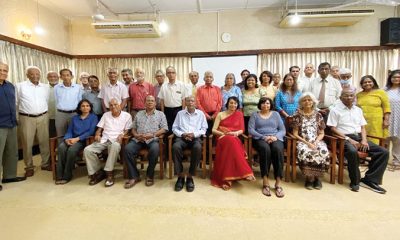
 Features4 days ago
Features4 days agoMinds and Memories picturing 65 years of Sri Lankan Politics and Society











